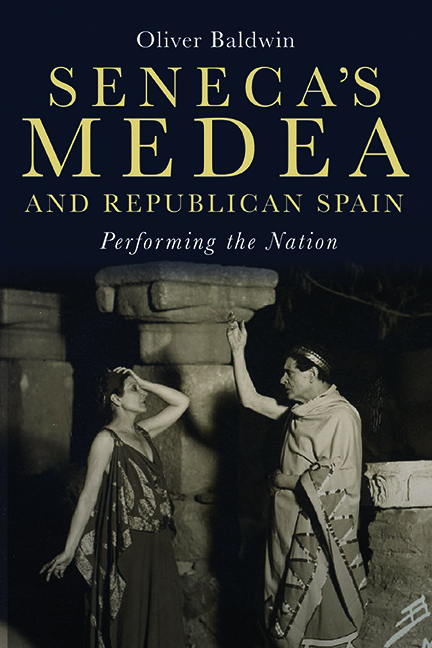Book contents
- Frontmatter
- Dedication
- Contents
- List of illustrations
- Acknowledgements
- List of abbreviations
- Introduction: A Spanish Medea in Republican Spain
- I Seneca’s Medea in Mérida: A reconstruction
- II Seneca and Hispania
- III Republica nunc sum: Building a Republic
- IV Medea and the social revolution
- V Hispano-Roman tragedy on a reformed stage
- Conclusion: The Republican Medea that was in Mérida
- Bibliography
- Index
Conclusion: The Republican Medea that was in Mérida
Published online by Cambridge University Press: 07 October 2022
- Frontmatter
- Dedication
- Contents
- List of illustrations
- Acknowledgements
- List of abbreviations
- Introduction: A Spanish Medea in Republican Spain
- I Seneca’s Medea in Mérida: A reconstruction
- II Seneca and Hispania
- III Republica nunc sum: Building a Republic
- IV Medea and the social revolution
- V Hispano-Roman tragedy on a reformed stage
- Conclusion: The Republican Medea that was in Mérida
- Bibliography
- Index
Summary
On 18 June 1933 Seneca's Medea was performed in the town of Mérida, once Emerita Augusta, in the region of Extremadura, Western Spain. It was a spectacular production undertaken by the Xirgu-Borràs Company and funded by the government of the Second Spanish Republic. More than three thousand spectators watched in admiration, expectation and awe how Medea's revenge unfolded on the stage of the Roman Theatre. All present experienced a communion that united the townsmen and townswomen of Mérida and its surroundings, with national intellectuals and MPs, the Italian Ambassador, two government ministers and the Prime Minister of the Second Spanish Republic. The performance of Seneca's Medea thus became one of the most memorable and meaningful theatrical productions and cultural events of the Second Spanish Republic and of the entirety of Spanish history:
But depending on the future of the Spanish stage, the resuscitated Seneca can constitute a starting date. Watching ‘Medea’, many realised what Theatre, with capital letters, is and in all its dimensions. Those who most need to learn from it – performers and managers of the theatre business alike – must not forget it.
This historical production came to encapsulate, develop or provoke an immense array of themes, theories, ideologies, conflicts, changes, and aesthetic practices that laid it at the very heart of the constituent years of the Second Spanish Republic (1931–33). As if an act of sorcery itself, the performance, at times wittingly, on many occasions unwittingly, came to exorcise, invoke, enchant, bewilder, possess and even annihilate the ideological, socio-political and cultural spectres of the Second Spanish Republic.
Its inception responded directly to the perceived need to reinstate the dramatic might of Spain's most ancient intellectual, poet, dramaturge and philosopher, thus redressing the historical and cultural bias in favour of Seneca the philosopher as the proto-Christian national sage. The production of Seneca's Medea came to exorcise the old regime's conception of the nation by invoking the spirit of a renewed Seneca Hispanicus, so that it might contribute to the new national endeavour, the pursuit of a republican nationalism based on secularism, liberty and the progressive continuum of Spanish culture, art and letters, here termed Hispanitas:
The performance of ‘Medea’, desired by scholars, mocked by ignorance, and scorned today by the forgetful people, was undoubtedly the resurrection of the very people who disdained it.
- Type
- Chapter
- Information
- Seneca's Medea and Republican SpainPerforming the Nation, pp. 263 - 268Publisher: Boydell & BrewerPrint publication year: 2022



